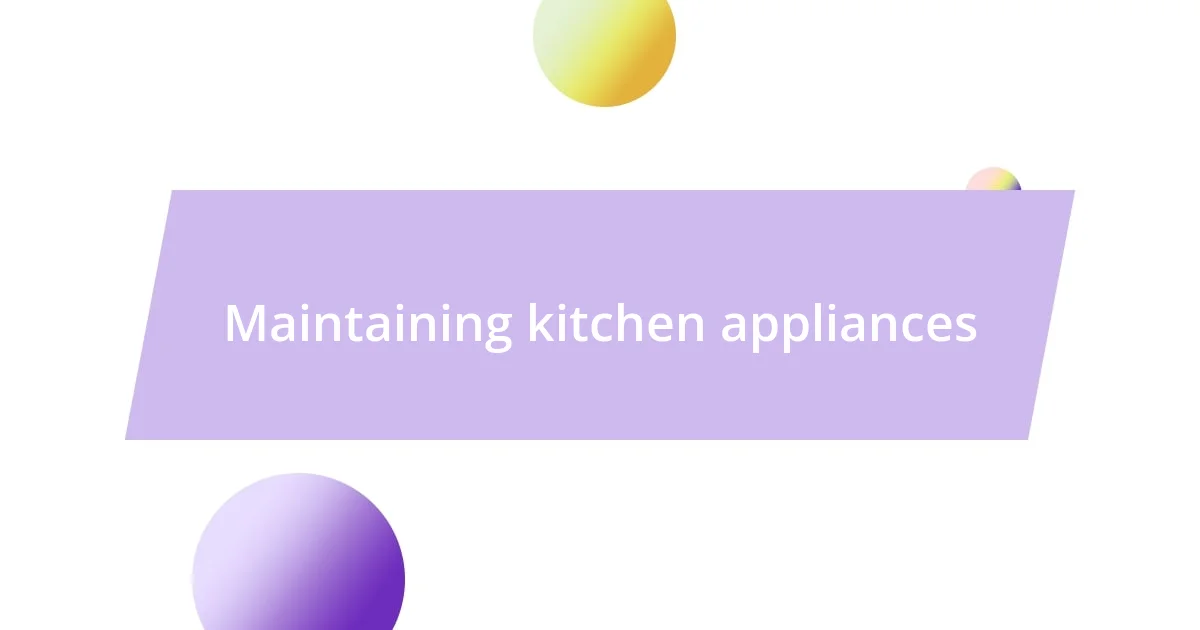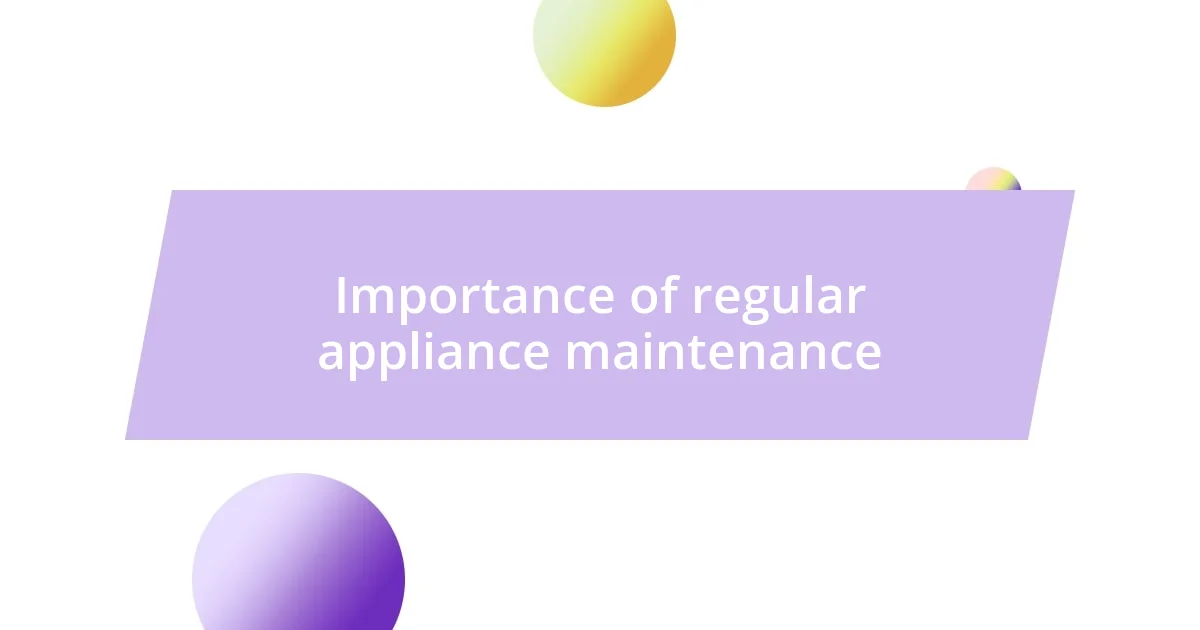Key takeaways:
- Routine maintenance, like cleaning refrigerator coils and checking for blockages, can significantly enhance appliance efficiency and longevity.
- Understanding and using appliance manuals can provide essential upkeep information that improves performance and prevents issues.
- Knowing when to call a professional for repairs, especially for troubleshooting complex problems or gas appliances, is crucial for safety and efficiency.

Essential appliance upkeep tips
One of the simplest yet most powerful tips I’ve learned in appliance upkeep is to routinely check for blockages, particularly in dishwashers and dryers. I remember a time when my dryer’s performance took a nosedive, and after some investigation, I found it was chock-full of lint. It was a wake-up call for me; I realized that just a few minutes of maintenance could prevent significant frustration later on.
Regularly cleaning the refrigerator coils is another essential tip I swear by. When I first discovered this, I was surprised at how much dirt and dust had accumulated there over time. It’s amazing how a little bit of effort can enhance the efficiency of your appliance and even lower energy bills. Have you ever noticed how your fridge sounds when it’s working harder than it needs to? It’s not just annoying; it’s an indicator that something might be off!
Lastly, always refer to your appliance manuals. I used to toss those things aside, thinking I wouldn’t need them—but I was sorely mistaken! The manual often contains specific upkeep advice that’s crucial for keeping your appliance in top shape. Each time I’ve turned to mine, I’ve discovered nuggets of information that have made a real difference in longevity and performance. How about you? When was the last time you consulted your appliance’s manual?

Maintaining kitchen appliances
Maintaining kitchen appliances is not just about keeping them clean; it’s about fostering a relationship with them. I remember the first time I took apart my blender to clean it thoroughly—I’ll be honest, I was nervous! But getting to see all the components up close helped me appreciate how each part plays a role. It’s like a little science experiment every time I tackle a cleaning session, and I’ve become more attuned to any unusual sounds or behaviors from my appliances.
I also found that organizing my kitchen space plays a major role in maintaining appliances. Clutter can not only make it hard to access them but can also trap heat or moisture, leading to potential issues. I once lost a blender jar behind a stack of mugs, and it ended up collecting dust for months. Since then, I’ve made it a point to create a designated space for each appliance, which has made upkeep so much smoother.
Lastly, I advocate for routine maintenance schedules. Just like we have appointments for our health, our appliances deserve the same treatment. When I started marking my calendar for tasks like descaling the coffee maker or cleaning the oven, I felt a weight lift off my shoulders. It limits those last-minute panic cleanings right before guests arrive and ensures that everything runs efficiently.
| Appliance | Maintenance Tip |
|---|---|
| Refrigerator | Clean the coils every six months |
| Dishwasher | Check for blockages in the filter monthly |
| Blender | Disassemble and clean after each use |
| Oven | Deep clean every three months |

Cleaning methods for efficient appliances
Cleaning my appliances has become a bit of a ritual for me. I find that using a simple vinegar and baking soda solution works wonders on a variety of surfaces. The first time I wiped down my microwave with this combination, I was honestly amazed at how effortlessly it cut through grease and grime. It felt like I had revived it from a sticky, forgotten state! Here are some methods I’ve had success with:
- Vinegar rinse: Great for dishwashers and refrigerators. It not only cleans but also neutralizes odors.
- Baking soda scrub: Perfect for scrubbing stovetops and ovens. Just make a paste with a little water.
- Microfiber cloths: Using them reduces scratches and leaves surfaces streak-free; I always have a stack ready.
The impact of these cleaning methods is significant. I remember a week after deep cleaning my oven, I cooked a roast, and the smells were heavenly. The even heating was a reminder of how well it was functioning. I began noticing how clean appliances made cooking and cleaning up afterwards so much more pleasant. Maintaining a clean kitchen actually inspires me to cook more, creating a cycle of freshness and efficiency. Isn’t it rewarding when an appliance feels like new again?

Troubleshooting common appliance issues
I often encounter small issues with my appliances that can turn into bigger headaches if not addressed promptly. For instance, I vividly recall a time when my dishwasher was making a strange clanking noise. At first, I was worried something serious was wrong. But after a quick look inside, I discovered a rogue fork lodged in the spray arm. Sometimes, all it takes is a little investigation to resolve what seems to be a crisis. Have you ever experienced something similar?
Another common issue I’ve faced is with my refrigerator not cooling properly. It happened during a heatwave, and I was panicked about spoiled food. My first step was checking the temperature settings and giving the coils a thorough clean. It turns out, accumulated dust was the culprit. I can’t stress enough how important it is to pay attention to the small signs your appliances give—like temperature fluctuations or strange sounds. They often signal that something needs your attention.
Then there’s the oven that refuses to heat evenly. After a few baking fails, I learned to check the heating elements and ensure they’re clean and free from any blockages. A quick wipe-down often does the trick. I sometimes wonder how many people overlook the impact of simple maintenance. I’ve found that these minor fixes can save not just time and money, but also the frustration of dealing with a malfunctioning appliance when you really need it. What’s your go-to fix for appliance troubles?

Importance of regular appliance maintenance
Regular maintenance of appliances is crucial for keeping them running smoothly and efficiently. I remember when I ignored the lint trap in my dryer for far too long. One day, I noticed it wasn’t drying clothes completely, and frustration set in. After finally cleaning it out, I was amazed at how quickly my clothes dried; it’s a vivid reminder that neglect can lead to inefficiency, impacting both time and electricity bills.
Moreover, routine check-ups can prolong the lifespan of appliances, saving you money in the long run. I had a friend who had to replace her refrigerator because she ignored a small leak that ended up causing major damage. It hit home for me, as regular inspections could have prevented that costly expense. Isn’t it fascinating how a small action can lead to significant savings?
The emotional aspect of taking care of appliances also resonates with me. I honestly feel a sense of pride knowing that my appliances are well-maintained. When I use a smooth-running blender or a quiet dishwasher, it elevates my cooking and cleaning experience. This sense of accomplishment isn’t just about functionality; it’s about creating a harmonious environment in my home. How does maintaining your appliances make you feel?

Best practices for appliance longevity
When it comes to ensuring my appliances stay in peak condition, I prioritize regular cleaning. I remember the time I decided to take apart my coffee maker for a deep clean. The difference was astonishing; not only did my coffee taste fresher, but it also brewed much faster. It made me wonder—how many of us overlook this simple maintenance step in our daily routines? A few minutes spent cleaning can really extend the life of our kitchen companions.
Another practice that has worked wonders for me is keeping manuals handy and following the recommended maintenance schedules. During one of my recent appliance check-ups, I discovered that my washing machine recommended monthly cleanings to prevent odors and buildup. After adopting this habit, I was pleasantly surprised to find that my laundry came out smelling fresher than ever. Isn’t it amazing how a little guidance can lead to such positive change?
Finally, being mindful of how I use my appliances has played a significant role in their longevity. I once noticed that my microwave started to smell burnt after constantly reheating meals in plastic containers. Once I switched to glassware, not only did the odor dissipate, but also the microwave functioned better overall. It brings to light how our choices can have an outsized impact—what simple change could you make in your appliance habits today?

When to call a professional
Knowing when to call a professional for appliance repairs can save you both time and stress. For instance, I once faced a situation where my oven stopped heating up. Initially, I tried to troubleshoot it myself by checking the settings and inspecting the power supply. However, when I realized that I didn’t have the necessary expertise to safely investigate the heating element, I quickly decided to call in an expert. Honestly, that was the right move—I got it fixed much faster than I would have on my own.
Another time, I noticed strange noises coming from my refrigerator, almost like a faint humming mixed with a click. Although I initially thought it was just a quirky sound, it gradually became louder and more concerning. I learned the hard way that ignoring such signs could lead to larger issues. A quick call to a professional allowed me to identify a problem with the compressor before it turned into a major expense. Have you ever overlooked a small issue, only for it to escalate? Trust me, those little hiccups can often mean big trouble down the line.
Lastly, if you’re ever faced with any gas appliances, that’s a definite red flag for professional help. I recall a friend who tried to fix a gas leak in her home after noticing a strange smell. Thankfully, she called a technician before attempting any repairs. It turned out to be a potentially dangerous situation. This experience taught me that some problems are simply not worth risking my safety over. How about you? When was the last time you prioritized safety over DIY?














